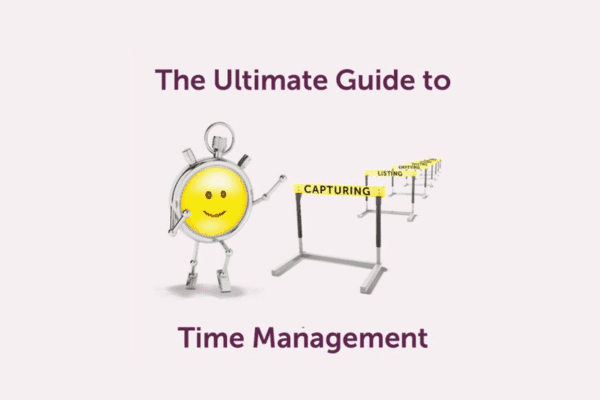Understand and Apply the Groceries Supply Code of Practice
Welcome to the Definitive Guide to GSCOP: Unraveling the Power of the Groceries Supply Code of Practice. Gain a clear understanding of its impact on your relationships with major supermarket groups.
We are dedicated supporters of suppliers in the UK grocery trade. Our mission is to empower you to maximize sales and profitability. We strive to assist you in engaging with supermarkets effectively.
Within this comprehensive guide, we have meticulously crafted an extensive resource. However, we acknowledge that the intricacies of your interactions with your vital customers cannot be fully encapsulated in a static written piece. That’s why we encourage you to reach out to us directly, allowing us to address your specific issues and challenges. Together, we will find tailored solutions to propel your success.

This Ultimate Guide will Cover:
- What is the Groceries Supply Code of Practice?
- Where Did It Come From and Why?
- Myths and Misunderstandings
- Who Are the Designated Retailers?
- How Does Groceries Supply Code of Practice Work?
- The Groceries Code Adjudicator
- How Do I Make A Complaint?
- Who Does the Groceries Supply Code of Practice Cover?
- Which Products Does GSCOP Cover?
- What’s in the Groceries Code?
- Is the Groceries Code and its Adjudicator just a Toothless Watchdog?
- How Many GSCOP Investigations Have There Been?
- How to Further Improve Your Supply Code of Practice Knowledge
- Further Reading and Resources
1) What is GSCOP? And the Meaning?
GSCOP, the Groceries Supply Code of Practice is a piece of UK government legislation. It puts certain restrictions on the purchasing activities of the very biggest supermarket chains. The intent of the legislation is to protect suppliers from some of their more extreme buying practices. It’s sometimes called ‘Grocery Supply Code of Practice GSCOP’, and ‘Groceries Supplier Code of Practice GSCOP’, ‘GSCOP code’. But more on those inaccuracies later.
2) Where Did the Groceries Supplier Code of Practice Code Come From and Why?
Groceries Supply Code of Practice traces its origins back to 2009. The Labour government at the time attempted to limit potential abuses of buying power by the UK’s biggest supermarket chains.
The biggest five UK grocery retailers, Tesco, Asda, Sainsbury’s, Morrisons and Aldi make up 76.1% of all UK grocery sales. Consequentially, they wield enormous buying power over their suppliers.
Lobby groups, including the powerful NFU (National Farmers Union), were arguing that there was an imbalance of power. This was putting undue commercial pressure on small suppliers, producers and farmers. Consequently, they wanted the government to take some form of regulatory control.
It’s no coincidence that the Labour government acted on this. The lobbying farmers and farming groups lived in rural, typically conservative voting constituencies. They saw an opportunity to boost their poll ratings and popularity. Whilst also reining in and generally restricting the effects of what they saw as ‘big, bad business’.
And so, following consultation and lobbying, it became law on the 4th of February 2010: The Groceries (Supply Chain Practices) Market Investigation Order 2009, the correct and full title for the Groceries Supply Code of Practice Code.
Watch Our One-minute Video on the Supply Code of Practice Code:
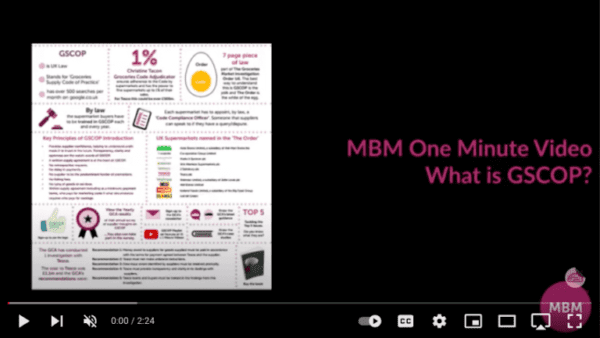
3) GSCOP Code: Myths and Misunderstandings
Many myths and misunderstandings have grown up around the Groceries Supply Code of Practice. Possibly, because only 41% of suppliers in the Adjudicator’s own survey said they had a ‘good understanding’ of the Groceries Supplier Code of Practice. Moreover, 50% still had no formal GSCOP training.
Perhaps the biggest misconception surrounding the Groceries Supply Code of Practice is that suppliers cannot be in breach of it.
Many suppliers confuse the Supply Code of Practice with the Competition law. This is a very different beast. One which suppliers must be aware of and take great care of, as the costs of a breach are severe.
In addition, the Groceries Supply Code of Practice only covers ‘designated retailers’. It is only those retailers that the Groceries Supplier Code of Practice binds. As a supplier, you do not need to worry about or fear breaching the Groceries Supplier Code of Practice. You cannot.
Test how well you know the Groceries Code with our online quiz.

4) Who are the Designated GSCOP Retailers?
To be classed as a designated Groceries Supply Code of Practice retailer, a company’s UK grocery sales turnover must be greater than £1 billion. Because of this, the list can change. Currently, there are 13 in the UK.
We shall see this in detail later, but the Supply Code of Practice does not cover all retailers and all categories. It is a ‘Groceries Code’. It covers the government’s, or perhaps an out-of-touch civil servant’s view, of what a ‘supermarket’ is and what constitutes a ‘grocery’ product. As a result, the Groceries Supply Code of Practice does not cover all retailers. Including those with more dubious buying practices, that would most certainly be in breach of it. Moreover, you, as one of their suppliers, have no legal redress against them under the Code.
Introduction and Implementation
As we shall see shortly, the successive governments that introduced and implemented the Groceries Supply Code of Practice were keen to keep food prices low. They didn’t want anything to prevent the big supermarkets from fighting ongoing price wars and keep food inflation low.
As a result, there is absolutely nothing in the Groceries Supply Code of Practice to stop a designated retailer from using its market share muscle. They are still free to demand forward-facing cost price reductions from their supplier base. The only caveats are that the demand should be ‘fair’ across all suppliers and without ‘duress’. Try proving a supermarket is in breach of being ‘fair’ and that you were put under ‘duress’ in a courtroom!
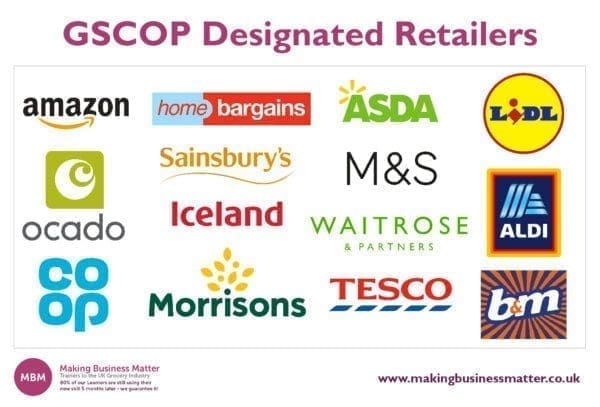
5) How Does The Supply Code of Practice Work?
The Groceries Supplier Code of Practice seeks to regulate certain aspects of the commercial relationship between supermarkets and suppliers. It aims to prevent potential abuses. This is due to the huge imbalance of power in the UK grocery supply chain as explained earlier.
The Groceries Code is overseen by an Adjudicator. An official appointed by the government to oversee the implementation, running and effectiveness of the code of conduct for suppliers. Under the supervision of the CMA, (Competition and Markets Authority), an Adjudicator was appointed in 2013.
Why is a 3-year delay in appointing an Adjudicator is the obvious question? Well, it’s down to political reality rather than necessarily the needs of low-income earners hard done by suppliers, farmers and producers.
The Labour government that introduced the Groceries Supply Code of Practice in 2009 became the Conservative-Liberal Democrat Coalition following the general election of May 2010. This includes not needing or wanting to pander quite so much to the lobbying voice of rural communities, the government realised (and was lobbied itself by the BRC (British Retail Consortium) representing the supermarkets), that actually supermarkets in the UK do a pretty good job of keeping food prices down. This, in turn, keeps inflation low, which in turn keeps the biggest lobbying group of them all – the electorate – happy!
Keeping Prices Low
The average net profit margins for UK supermarkets are around 2% or 3%. Put very simply, for every £1 the supermarkets take out of the supplier base by whatever means, fair or potentially foul, 97p or 98p goes to the consumer or shopper in the form of lower prices
Little wonder then that the government whilst wanting to show some sympathy for the (genuine) plight of farmers and small producers, did absolutely not want to do anything to stop the big supermarket chains from knocking lumps out of each other on price.
The result was twofold. Firstly the Groceries Code was ‘watered’ down to not overly restrict the supermarkets’ ability to drive down retail prices. In short, to prevent undermining the current efficient and low-cost supply chains.
Secondly, rather than appointing an Ombudsman with sweeping regulatory powers (think OFWAT, OFCOM, OFTEL), an Adjudicator with fewer powers of control was put in place.
To learn more about how the Groceries Supplier Code of Practice works, take a look at our helpful infographic below.
Click the image for a higher resolution:

6) The Groceries Code Adjudicator
The Groceries Code Adjudicator is a part-time government-salaried position. It was occupied by Christine Tacon who has been in place since the Adjudicator position was first created in 2013.
On the 1st of July 2020, Mark White was appointed, replacing Christine Tacon. Mark White said, ‘I am delighted to have been appointed to succeed Christine Tacon.’
I welcome the opportunity to build on Christine’s work and as GCA my objective will be to drive forward the progress that has been made to date.
As the annual survey has shown, much has been achieved, but there is still more to be done and I welcome the government’s commitment in its response to the Statutory Review to work with me to help suppliers feel empowered to raise issues in confidence with the GCA and their retailers directly.
The GCA’s role is to ‘Arbitrate, Investigate and Fine’. As of 2015, Christine gained the power to fine retailers in breach of Groceries Supplier Code of Practice 1% of their UK turnover. However, she did not impose any such sanction during her tenure.
The Groceries Code Adjudicator comprises an office of 6 full-time equivalent staff. Funding for its running costs comes from an annual levy on the designated retailers.
Read the Code Confident Pack from the new GCA – Mark White – GSCOP Adjudicator.
7) How Do I Make a Complaint?
Now, for one of the most strange and bizarre aspects of the Groceries Supplier Code of Practice Code legislation. As a supplier, you cannot automatically invoke a formal complaint against a designated retailer directly with the Adjudicator. You must first approach the alleged offending retailer.
It’s the grocery equivalent of a back ally mugging late at night. Yet, instead of being able to call the police, you have to go back and politely ask the person who just mugged you for your money back!
Unusual Process for Complaints
Strange but true! The only way of invoking a formal, legal complaint under the Groceries Supplier Code of Practice is to approach the ‘Senior Buyer’ for the category in which you operate. The ‘Senior Buyer’ must be a named commercial contact inside the designated retailer. Furthermore, they must feature as such in your written supply agreement.
Should you not be satisfied with the response or outcome of your complaint to the Senior Buyer. Your second port of call is to the designated retailer’s Code Compliance Officer’. Again, a named, specific individual inside each designated retailer cannot be part of the commercial buying structure. Typically, in most instances are part of the corporate legal or secretariat team.
Once alerted to a dispute, they legally have 21 days to find a resolution to your issue. At which point, and only then, can you formally approach the Adjudicator with your complaint?
Fear of Retribution Hinders Supplier Complaints:
Unsurprisingly you can count on the fingers of one hand the number of formal complaints the Adjudicator has received since coming into office. The Adjudicator’s own annual supplier survey in 2015 cited that 68% of suppliers would not raise a Code issue with a retailer for ‘fear of retribution’.
8) Who Does the Groceries Supply Code of Practice Cover?
The Groceries Supplier Code of Practice doesn’t cover all supermarkets and all products. Initially, only 10 ‘designated retailers’ with grocery sales above £1 billion were covered by the legislation. These are Tesco, Asda, Sainsbury’s, Morrisons, Aldi, Lidl, Co-Op, Marks & Spencer, Waitrose and Iceland.
Two more were added in November 2018, B&M and Ocado. Then, Home Bargains was added in September 2019. From the 1st March 2022, Amazon was added to the list by the Groceries Code Adjudicator, Mark White. Therefore, the Code of Conduct for Suppliers regulates the behaviour of the top 14 grocery retailers.
This leaves a whole host of retailers with large food businesses, many over the £1 billion threshold, not covered by the Supply Code of Practice. Therefore, not subject to any restrictions on the way they conduct their commercial relationships with their suppliers. For instance, WH Smith Travel, Boots, and Poundland to name but a few.
Coverage of Suppliers and Subsidiaries
The Groceries Supplier Code of Practice covers all suppliers whether or not UK owned and based who supply a designated retailer in the UK. It also covers all wholly-owned subsidiaries of a designated retailer. So, Booker became covered by the GSCOP Code when Tesco purchased them in 2017. As did NISA when Co-Op similarly purchased them.
The Groceries Supply Code of Practice does not, however, cover retailers with supply agreements with designated retailers. For instance, Costcutter has a supply agreement with Co-Op but is not covered by the Code. Similarly, it does not cover McColls, despite having a supply agreement with Morrisons.
9) Which Products Does GSCOP Cover?
Technically, not all products are covered by the Groceries Supplier Code of Practice. It is a ‘Groceries Code’. The legislation stipulates that it covers food, pet food, toiletries, household, cleaning and drinks. However, many other things that large supermarkets sell are not covered. This includes tobacco, petrol, books, plants and flowers, perfumes and cosmetics, cards, clothing, kitchen hardware, electricals, news, magazines, audio and video and toys.
In practice, most of the designated retailers, both for practical purposes (buyers move categories regularly) and for full transparency cover all the products they sell under their Supplier Code of Practice obligations.
However, a word of warning if you are a supplier in one of the non-covered categories. If you do not have a written supply agreement that encompasses the Groceries Code, you may find it very difficult to get any form of redress, from either the designated retailer or the Adjudicator in the event of a dispute.
Excuse the Interruption, but Here’s a Little Bit About Us…
We are the soft skills training provider to the UK Grocery Industry, helping Suppliers to win more business. They choose us because of our money-back guarantee, our relevant experience, and because we make their learning stick.
Click the banner below to learn more:

10) What’s in the Groceries Code / GSCOP Code?
The Groceries Supply Code of Practice has 14 sections that cover specific aspects of a nominated retailer’s dealings with suppliers of grocery products.
We will now briefly examine each one. We will give you a broad understanding of what each one means and how it may impact your day-to-day dealings with those of your customers covered by the Supplier Code of Practice.
Do remember, however, that as previously mentioned we cannot cover here every nuance and detail of the Groceries Supplier Code of Practice. Or how in individual circumstances it may affect you. Please do get in touch, or fill out the form at the end of this guide, if you have any questions, queries, or concerns. We are here to support and help.
Retailers Shan’t Request Retrospective Changes:
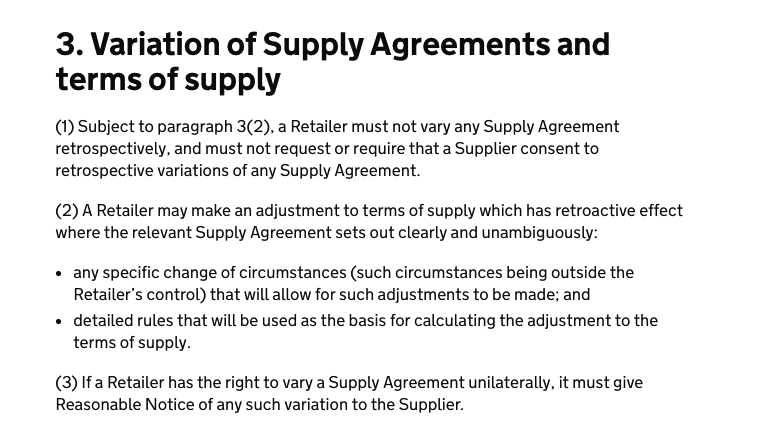
We have already talked about the importance of the written supply agreement. In addition, how it constitutes the cornerstone of any protection you may have under the Groceries Code.
This is one of the strongest pieces of protection the Groceries Supply Code of Practice offers suppliers. Retailers cannot make or ask for any retrospective changes to a written supply agreement. In short, this means they cannot either ask for or arbitrarily implement any measure that would mean a backdating of invoices, promotional contributions or override payments (amongst others).
A Retailer Must Not Directly or Indirectly Require a Supplier to Change Significantly Any Aspect of Its Supply Chain Procedures During the Period of a Supply Agreement:
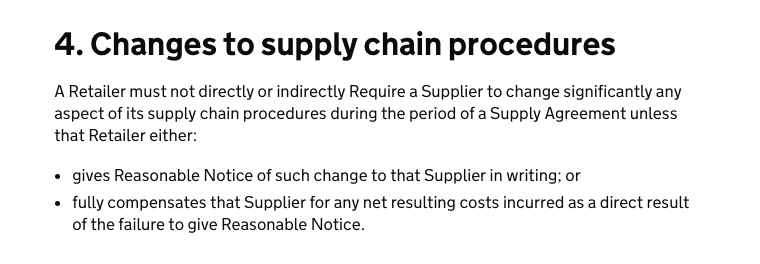
Yes, they can ask or request that you make changes to your supply chain arrangements with them. For instance, delivering to additional RDCs, shorter order-to-delivery lead times, different booking times etc. However, they cannot impose them upon you without consultation and without giving you reasonable notice.
Retailers May Only De-List a Supplier for Genuine Commercial Reasons:
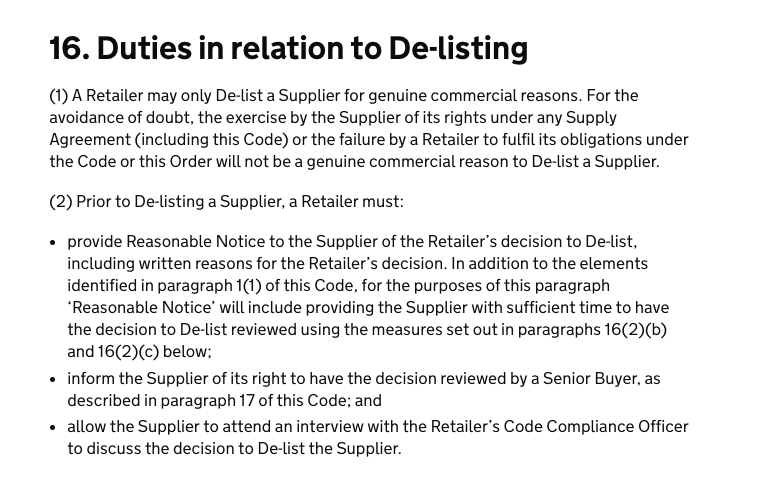
Your written supply agreement with a designated retailer must explain clearly their de-listing process. Furthermore, it should also contain your rights to appeal either directly to them, to their Code Compliance Officer (CCO), or to the Groceries Code Adjudicator. They must also give you reasonable notice of a de-list.
In practice, most of the retailers covered by the Groceries Supplier Code of Practice have settled upon 6 months as the minimum notice period. This is not just for de-list as a supplier, but for product delists, and, in some cases, ranging reductions (number of stores a product is listed in).
A Retailer Must Pay a Supplier for Groceries Delivered to That Retailer’s Specification in accordance with the Relevant Supply Agreement:

This is one of the more straightforward elements of the Supplier Code of Practice. Designated retailers must pay their suppliers to the terms set out in the written supply agreement provided the goods supplied are to the agreed specification. However, the Supply Code of Practice does not stipulate how long payment terms should be. The number of days of credit you give a customer is an important part of the initial negotiations you have with any of the designated retailers under the Groceries Supplier Code of Practice.
No Obligation to Contribute to Marketing Costs in the GSCOP Code:
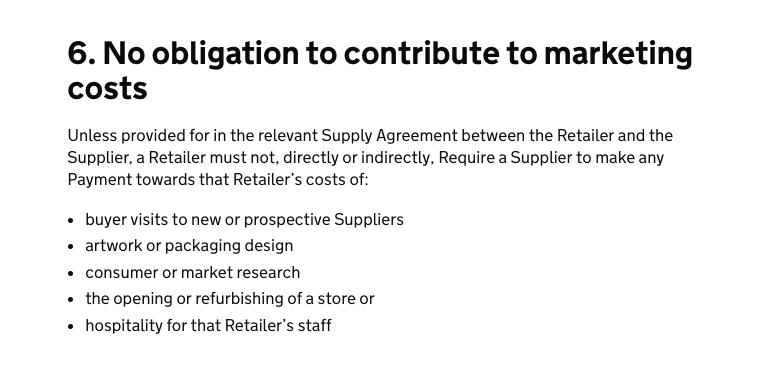
This is a huge area of traditional and potential cost for suppliers. Many of them do not realise that they do not have to necessarily pay for many things that retailers ask of them.
The key here is the difference between Request and Require. For example, designated retailers cannot Require (or force) you to pay for the following:
- Point of sale
- Consumer research
- Hospitality
- Travel
- New store openings
They can, however, ask or Request that you invest in these things. Furthermore, if that Request is in your written supply agreement, and you have signed it, then you become automatically obligated.
It is, therefore, vitally important that you understand what you have signed up for in your supply agreements with designated retailers under the Groceries Supplier Code of Practice.
Remember, a written supply agreement may be deemed to be a Joint Business Plan document, an own-brand specification document, or even a retailer’s standard terms and conditions of business on their website or supplier portal.
This area of the Groceries Supply Code of Practice is probably the least clear. It’s the most ambiguous and it is, therefore, open to all sorts of interpretation and potential abuse. So, please do speak to us here at MBM if you are in any way concerned that you may have signed up for any significant investments with designated retailers that you are now unhappy about.
A Supply Agreement Must Not Include Provisions Under Which a Supplier Makes Payments to a Retailer as Compensation for Shrinkage:

This is the clearest, black-and-white section of the Groceries Code. This is thanks possibly to the lobbying power of the likes of Proctor and Gamble and Unilever. Designated retailers under the Groceries Supplier Code of Practice simply cannot, full stop, either Request or Require that you as a supplier make any payments for shrinkage. Shrinkage is any losses due to theft or damage incurred once they have taken delivery of the goods and the title has passed.
A Retailer Must Not Require a Supplier to Make Any Payments to Cover Wastage Unless Such Wastage Is Due to the Negligence of That Supplier:
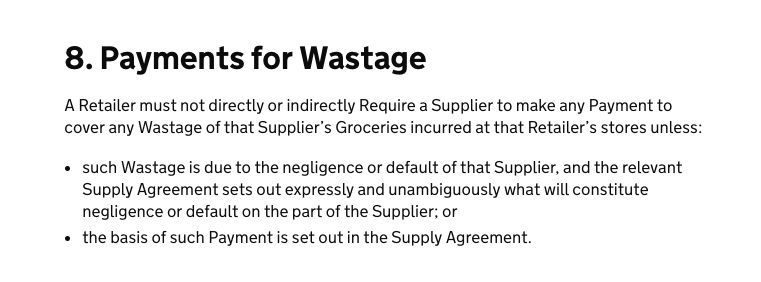
The Groceries Supplier Code of Practice treats wastage a little differently than shrinkage. It is a demonstration of the lobbying power of the supermarkets during the consultation phase before GSCOP became law.
Supermarkets covered by the Supplier Code of Practice cannot either Request or Require any payment for shrinkage. However, they are able to Request payments for wastage. These are product(s) that are reduced to clear or thrown away because of low or no remaining shelf life.
During the consultation phase of the Supplier Code of Practice, retailers successfully argued that if they were not able to share the cost of fresh food wastage with suppliers then they would not be able to take the risk of launching quite so many products. As a result, choice, and more importantly, (to the government) prices would be affected!
Once again, the overarching importance of that written supply agreement is paramount. Check what you have or have not agreed to. Be sure to check joint business plan documents, own brand specification documents and terms and conditions documents.
Limited Circumstances for Payments as a Condition of Being a Supplier:
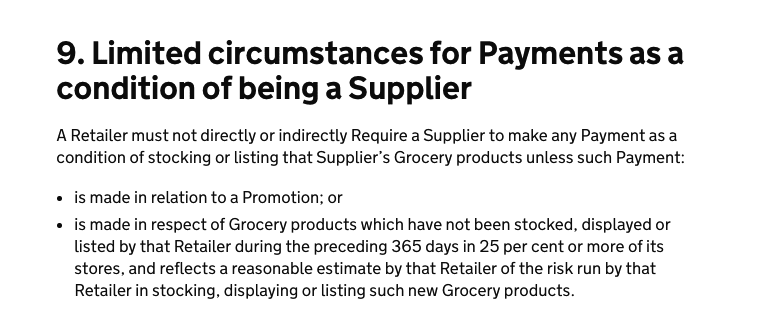
This is an often misunderstood part of the Groceries Supplier Code of Practice Code.
Retailers can Require or insist that you pay a new line listing fee. What they cannot do is either ask or require that you pay ‘listing’ fees for ongoing products. For instance, products already listed in at least 25% of their store estate over the past 12 months.
There is no stipulation as to how little or large the listing fee can be.
No Payments for Better Positioning of Goods Unless in Relation to Promotions:

Again, a potential area of misunderstanding and confusion for many suppliers. Even for the press, and also, the Groceries Code Adjudicator!
According to the Groceries Supplier Code of Practice, designated retailers can Require that suppliers pay for their products featured in promotional space.
This again is the result of the influence and power of the retailers’ lobbying of the government. The retailers’ argument was simple. If they were unable to charge for promotional features, they would do fewer promotions and prices to consumers would be higher!
Retailers cannot Require any payments for better space or positioning of your products. Examples are an eye-level shelf, an off-fixture display, an end cap, and a foyer display. But, the writing of the supplier code of practice allows them to Request payment from you. And, of course, you as a supplier are free to offer payment for better space. In fact, it is the interest of many big brands to do just that. Offer to pay for branded space and feature in-store.
A Contentious Publication
This became quite contentious back in 2015. Following the publication of a buyer‘s letter to suppliers offering hot spot space in return for payment. The letter was leaked to and published by the Grocer and, subsequently, the Daily Mail. As a result, the Groceries Code Adjudicator was asked for comment. Christine Tacon said she was ‘Fminded’ that such an approach for payment was ‘not in the spirit of GSCOP’.
The result was that there was no investigation or fine for the retailer in question. It was not a technical breach of the law. However, the power of the Adjudicator to ‘mind’ that it was in breach of the ‘spirit’ of the Supplier Code of Practice has led to changes. It led to almost all of the retailers covered by the Groceries Supply Code of Practice amending their buying practices. They no longer ask for such payments, or to include them in supply agreements, even if suppliers offer them of their own volition.
A Retailer Must Not, Directly or Indirectly, Require a Supplier Predominantly to Fund the Costs of a Promotion:
This is an important element of the Groceries Supplier Code of Practice, especially for own-brand suppliers. Designated retailers under the Groceries Code cannot Require that you fund more than 50% of the cost of any promotions you do. They can, of course, ask or Request. You, once again, need to check what you have signed up for in your written supply agreement with them.
No Unjustified Payment for Consumer Complaints:
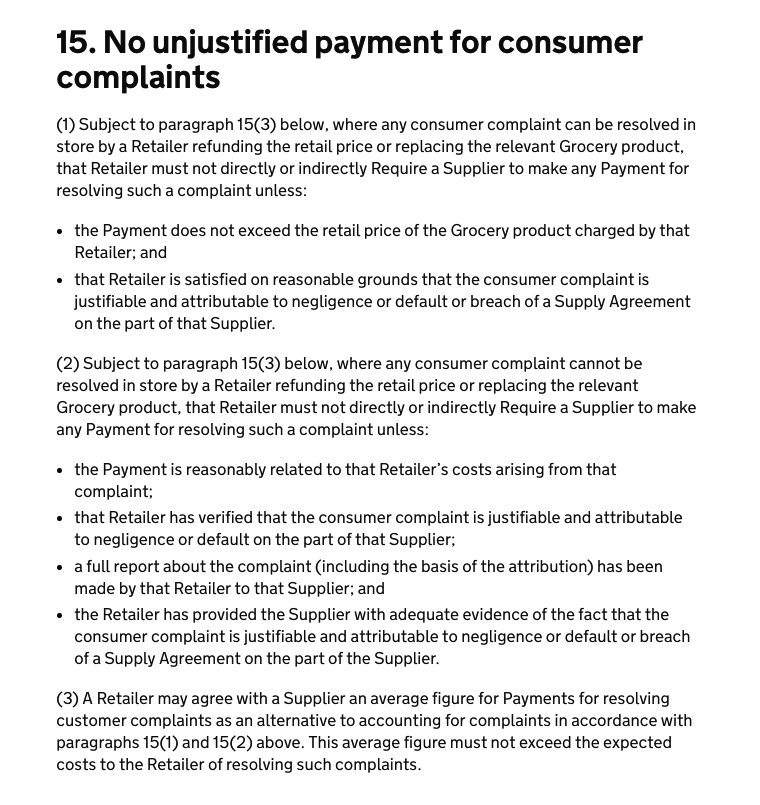
If you ever read the Groceries Code, you will find that this is the hardest element to understand. Both in terms of wording and meaning. However, what it boils down to is relatively simple. Simply put, designated retailers cannot charge excessive amounts for customer complaints.
You are entitled to the analysis and explanation of every single customer complaint. But, in practice, this would grind both businesses to a halt. So, pragmatically, Groceries Supplier Code of Practice rules allow retailers to include in their written supply agreement an average sum for each customer complaint. This sum is in proportion to their overall costs of handling customer complaints. In practice, this has now meant that none of the designated retailers charges more than £25 per customer complaint.
Due Care to Be Taken When Ordering for Promotions:
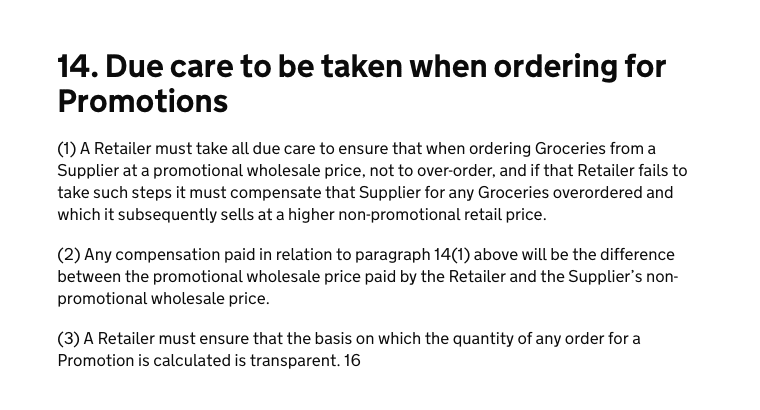
A somewhat outmoded element of the Groceries Supply Code of Practice. Possibly an example of how the government and civil service when drafting legislation do not fully understand how industries operate.
The Groceries Supplier Code of Practice rules do not allow retailers to over-order promotionally priced or funded stock that they then sell after the promotion at the higher, non-promoted price. This is to prevent a financial stock gain, known historically in the trade as ‘stock bouncing’.
In the past, retailers covered by the Groceries Code would have promotional ‘buy-ins’ of at least 2 weeks before a promotion. And sometimes even a week after! The Groceries Supply Code of Practice seeks to stop the use of this practice to over-order stock to then make a financial gain.
In practice, it almost no longer happens in the designated retailers covered by the Groceries Supplier Code of Practice. They have all moved to ‘trigger funding’. Whereby any promotional investment by the supplier is only ever ‘triggered’ when the promotion is actually redeemed by the shopper scanning the product and paying for it at the checkout.
A Retailer Must Fully Compensate a Supplier for Any Cost Incurred by That Supplier as a result of Any Forecasting Error in Relation to Grocery Products and Attributable to That Retailer:
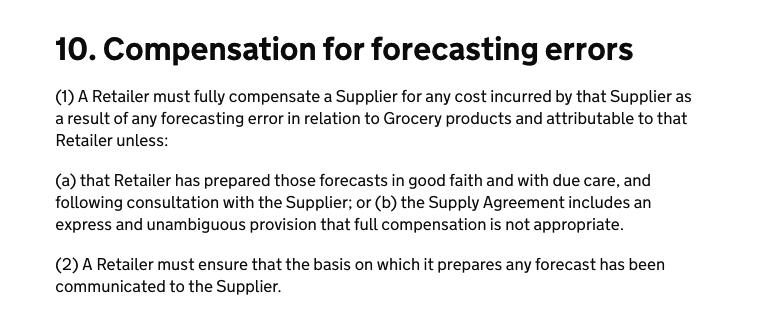
This is the biggest potential ‘barn door’ in the Groceries Supply Code of Practice. The one element that must have made the retailers that the Groceries Supplier Code of Practice applies is to go white with fear!
As written into the legislation, it is open season for any supplier to claim compensation for any supply chain costs caused by an inaccurate forecast by a designated retailer. These include costs of extra deliveries, overtime or buying emergency stocks when forecasts are too low or wasted stock, unused equipment and wages paid for no work when forecasts are too high.
Each of the retailers covered by the Groceries Supplier Code of Practice, not unsurprisingly, very quickly moved to ‘shut and bolt’ the ‘barn door’. They added phrases such as ‘all forecasts are provided in good faith and with due care’ to their written supply agreements, email footers and general terms and conditions of business.
No Tying of Third-Party Goods and Services for Payment:
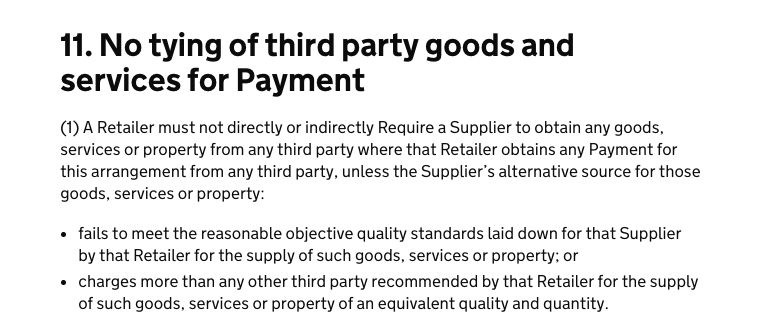
11) Is the Groceries Code and its Adjudicator just a Toothless Watchdog?

The then Adjudicator, Christine Tacon has taken a very sensible and pragmatic approach to her tenure.
She would have very quickly realised upon taking her position that the phones would be very quiet and her email inbox very empty. Suppliers would be, quite rightly, very reluctant to raise any issues for fear of retribution from very powerful supermarket groups. Even more so when the legislation dictates that the victim has to approach the very person that mugged them in the first place for any redress!
So, she has embarked on what she has self-styled as a ‘collaborative approach’ with both suppliers and designated retailers.
By offering anonymity to suppliers that approach her directly and then pooling their problems into ‘top issues’, she has used the GSCOP Code Compliance Officers to raise generic industry issues within the designated retailers and persuaded and cajoled them into change without having to resort to the imposition of any of her legal fining powers.
She successfully convinced designated retailers to limit forensic audits to a maximum of three years. She persuaded designated retailers to cease unfair drop and drive charges, along with associated invoice payment delays. Additionally, she secured an agreement for improved transparency in forecast generation and promotion planning.
12) How Many GSCOP Investigations Have There Been?
During Christine’s term, she has conducted two formal ‘investigations’ into designated retailer breaches of the Groceries Supplier Code of Practice. The first one was in 2015 into the GSCOP Tesco ‘financial accounting scandal’. The second and most recent one, was last year in the Co-Op group.
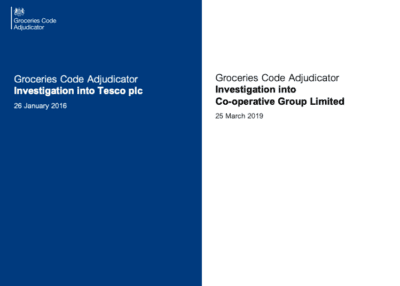
In both instances, whilst finding evidence of both organisations to be in breach of the Groceries Code, she did not invoke her formal powers to fine them up to 1% of their UK turnover. Instead, they preferred to maintain their cooperation and willingness to change for the better. This was opposed to risking a long, protracted and costly legal process.
The Motivation Behind Retailers’ Cooperation with the Adjudicator
Retailers are continuing to work with the Adjudicator to genuinely improve their buying practices and relationships with their suppliers. The cynics amongst you will no doubt ask why? The designated retailers may have a slightly cynical response. They are aware that working with the Groceries Supplier Code of Practice, as it is currently written and policed, is in their best interest.
As we have seen there is absolutely nothing in the Groceries Code to stop a retailer from using its market share buying power to leverage lower prices. So, why would a designated retailer, by definition those with the biggest market shares, want to be seen to be not working with the Groceries Code? Just in case by not working with it, a government (present or future) decides to really crack down and restrict the way they operate through price controls or some such mechanism.
13) How to Further Improve Your Code Knowledge
At Making Business Matter, we are passionate about helping you, the suppliers of the UK supermarket trade. We want you to sell more products successfully and to make more money in so doing.
We trust that this guide has shed light on what may initially appear as a perplexing topic. Our intention is for it to provide you with greater confidence in your understanding and knowledge of the subject matter.
The Groceries Code is there to help you. It has been and is making a difference in the way big supermarkets treat their suppliers. So make the most of your newfound knowledge. Ensure you have or know what constitutes your written supply agreement. Lastly, make sure you are happy it works for you and your business.
If you are not happy it does, speak to Making Business Matter. See our information below:
GSCOP Helpline: Call 0333 247 2012, and we’ll arrange for one of our GSCOP experts to call you back.
Groceries Supply Code of Practice / GSCOP Training
There are also training courses available. You will find MBM listed in the directory of Supply Code of Practice training providers on the government services and information website.
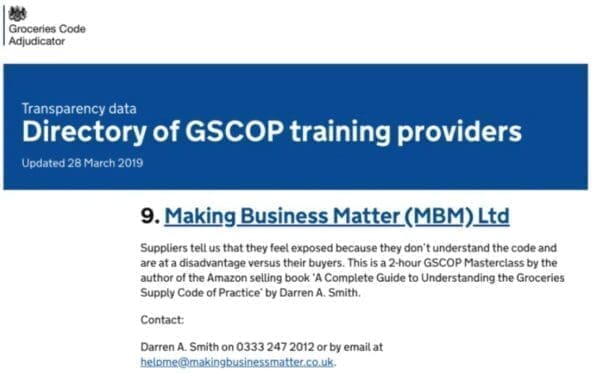
At MBM, we prefer to save you £500 and a day of Groceries Supplier Code of Practice training by offering you a book. A strange statement coming from a training provider. It is because we believe in the importance of this legislation.
Moreover, we believe that you can achieve your goals by reading the book fully. That way, it is easier to reference back to when you need it. To complement the book, we also offer a Groceries Supplier Code of Practice Masterclass with its author, and MBM founder, Darren A. Smith.
Our recommendation is to buy the book, attend the Masterclass and then combine that knowledge with Influencing Skills and/or Negotiation Skills training. Alternatively, take a look at our full range of training products.
e-Learning
In addition to the book and Masterclass, we now also offer a reasonably priced GSCOP e-Learning course. This product consists of 3 x 20-minute modules. Each module will require a pass mark of over 80%. We envisage only 7 in 10 passing this online course. Included in the course will be views from supermarkets, and access to over 25 x 1-minute videos.
14) Further Reading and Resources
You can find further insight, detailed definitions and clarification of all the key terms mentioned in this guide in our GSCOP Glossary. Additionally, check out our dedicated Supply Code of Practice page for further resources.
#1- Articles from Our Blog:
- Online Grocery
- Macro Trends
- Supplier management
- Grocery debates
- Grocery award
#2- Groceries Supplier Code of Practice Code Book
Want to know more about your rights under the Supplier Code of Practice? Take a look at extracts from the Groceries Supplier Code of Practice Book. Written by our very own founder, Darren A. Smith, the book is designed for you, people that work in the UK Grocery Industry. Specifically, Sales Directors, Category Managers, and National Account Managers to major UK supermarkets. Providing a comprehensive overview of your rights under the Groceries Supplier Code of Practice, helps you to understand the ‘Groceries Supplier Code of Practice rules of the game’.

Buy the Groceries Supply Code of Practice Book – Click Option 1, 2, or 3:
You can buy the 74-page book on either:
- Digital book from Amazon.co.uk (Read the 4.5/5 reviews)
- Preview on Google Books
GSCOP Aware Association:

The Groceries Supplier Code of Practice Aware Association was formed with one mission. This is to establish the mark for Suppliers, demonstrating their GSCOP awareness. Joining is based on passing an online assessment regarding the Supplier Code of Practice that we envisage two-thirds will fail.
#3- Groceries Supplier Code of Practice Code Videos






